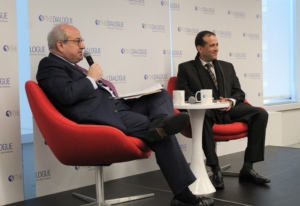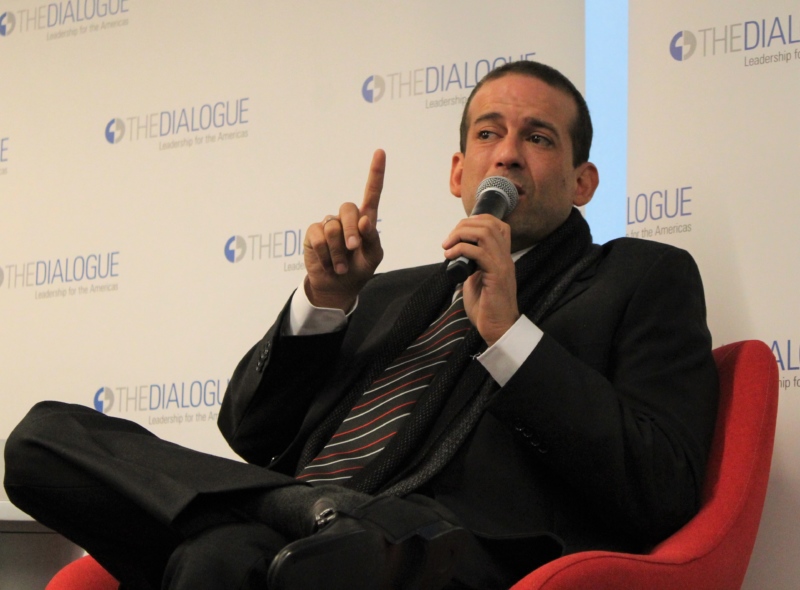Can Spain Solve the Cuba Problem?
By all accounts, Spain wants to bring change to the European Union’s Cuba policy. In so doing, it is tackling a foreign policy challenge that often sheds more heat than light.
On December 10, 2019, the Inter-American Dialogue hosted "A Conversation with Luis Fernando Camacho", a public discussion with Camacho, a Bolivian lawyer from Santa Cruz who vowed to “bring the Bible back to the government.” Following the protests in response to the October 20 presidential vote, Camacho quickly emerged as a new leader in the anti-Evo Morales movement. Previously, he served as president of the Comite Pro Santa Cruz, an organization of businesses, unions and neighborhood associations based in the province of Santa Cruz. Toward the end of November, Luis Fernando Camacho announced his bid for the presidency in the upcoming election organized by Jeanine Añez, head of the interim government. Michael Shifter, president of the Dialogue, moderated the discussion.
Shifter began the event with an overview of the recent events in Bolivia. He described the October presidential elections in which Evo Morales sought a fourth term. His declaration of victory was met with allegations of fraud, which were supported by the findings of a report by the Organization of American States (OAS). During this time Camacho, relatively unknown outside of Bolivia, rose as a relevant figure in Bolivian politics, encouraging protests to demand the departure of Morales. On November 10, Morales resigned, sparking considerable controversy in the bitterly polarized country. While some argue Morales was ousted by a military coup, others maintain that a popular revolt over electoral fraud made the situation untenable and forced him to resign. Shifter noted that interim President Áñez now has the task of organizing free and fair elections in the coming months.

Shifter began the conservation with Camacho by asking him to state the purpose of his stay in Washington. His answer was two-fold: first, he recognized that the United States is home to one of the largest populations of Bolivians living outside of Bolivia and claimed that they demonstrated support for Morales’ resignation; second, he stated he was in DC to thank the OAS for the role their report played in initiating calls for change and giving legitimacy to those who demanded the resignation of Morales.
The conversation then shifted to Camacho’s opinion on the social, political, and economic state of Bolivia. Camacho commented that two of the greatest problems in Bolivia are health and education. Shifter asked about political division in the country and how he plans to accomplish his political objectives in such a divided country. Camacho claimed the Bolivians from all sectors unified under the demand for the resignation of Morales, implying that this division would not be as pressing an issue as it may seem.
Shifter then brought up the OAS’s Inter-American Commission on Human Right’s (IACHR) report on human rights violations in Bolivia after the resignation of Morales. IACHR reported that their team had “observed severe acts of violence, which would have resulted in at least four people killed, 426 injured, and 227 detained.” The report suggests that be an international investigation into human rights violations in Bolivia in the post-election context. When asked about this, Camacho agreed that there should be an objective investigation but pressed that it looks into past human rights violations that occurred during Morales’ presidency.
Shifter then asked about Camacho’s political aspirations, questioning why he would want to become president when civil discontent with government leaders is so common in the region at the moment. Camacho answered that initially he had not really considered the presidency—his objective was to restore democracy and demand Morales’ departure. He commented on the number of women and young people that took to the streets after the October election. He stated that it was the unity of the Bolivian people that generated the success of their movement.
During the audience Q&A, Camacho was pressed to expand on various issues, including details of his presidency of the Comite Pro Santa Cruz, his plans for restoring international relations, and how he plans to better the Bolivian economy without adversely affecting the environment. Regarding the environmental question, Camacho stated that he believes in decreasing the power of the federal government, opining that municipal governments know their own needs best. Considering the question of international relations, he answered that “radicalism is not good for anyone.” He argued that, beyond political or ideological passions, international relations should be based on the greater good for both countries.
By all accounts, Spain wants to bring change to the European Union’s Cuba policy. In so doing, it is tackling a foreign policy challenge that often sheds more heat than light.
When Haiti was struck by a devastating earthquake, the administration of U.S. President Barack Obama quickly absorbed the depth of the tragedy and necessity of a robust U.S. response. Unless the U.S. adopts a proactive role, Haiti’s fragmented political landscape threatens to deteriorate into a political vacuum that will compound the current crisis.
Politics is swirling everywhere. Such are the ways of democracies, especially when oppositions come alive and defeat or threaten incumbents.
 Irene Estefanía González | Inter-American Dialogue
Irene Estefanía González | Inter-American Dialogue